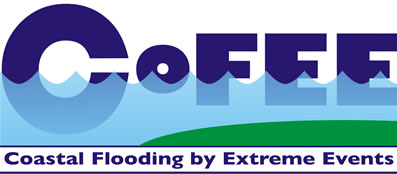Project

FREE - Coastal Flooding by Extreme Events (CoFEE)
Abstract
The Coastal Flooding by Extreme Events (CoFEE) project is a NERC Flood Risk for Extreme Events (FREE) Research Programme project (Round 1 - NE/E002471/1 - Duration April 2007 - May 2010) led by Prof. Jon Williams, University of Plymouth. The data and metadata from this project will be stored at the British Oceanographic Data Centre.
Details
| Keywords: | Not defined |
|---|---|
| Previously used record identifiers: |
http://badc.nerc.ac.uk/view/badc.nerc.ac.uk__ATOM__ACTIVITY_f61a3730-42e9-11e1-85c9-00163e251233
http://badc.nerc.ac.uk/view/badc.nerc.ac.uk__ATOM__dataent_12275382103626872
|
More Information (under review)
Over the next 100 years sea level will rise and there may be more severe storms. This will increase the coastal flooding risk to property, businesses, industry, roads and rail networks at great cost to us all. We must now face the consequences of climate change and either invest in sustainable defences or develop new ways to live with more flooding. The first option will cost a great deal of money and the second option may mean we need to change radically the way we currently occupy and use the coastal environment.
The Coastal Flooding by Extreme Events (CoFEE) project will use our present knowledge of the eastern Irish Sea coastline in computer models to investigate the speed and extent of coastal flooding during storms and to determine how sensitive our coasts are to extreme events.
CoFEE will attempt to answer 4 questions:
(a) how big will coastal floods be in the future;
(b) which types of coast can we leave to flood and which must we defend;
(c) what might the coast look like in the future;
(d) what are the risks of allowing coastal flooding to occur?
CoFEE will look at different natural coastlines that include, estuaries, beaches and sand dunes and coastlines that are defended by a range of man-made structures. The results will be applicable to coastal areas elsewhere in Britain and more widely.
By bringing together scientists, engineers and the people who plan flood defences, CoFEE will provide the basis for predicting the threat of coastal floods in a changing climate so that resources can be better targeted to deliver more effective, better informed and sustainable strategies for managing the flood risk to our coastlines in the future.
Project Duration: April 2007 - May 2010.
This project is funded by NERC - Grant Ref. NE/E002471/1 - through the Flood Risk for Extreme Events (FREE) NERC directed mode programme.
The main thrust of this project is to develop a catchment-to-coast model that will focus on the coastline between the Rivers Ribble and Mersey. It will use boundary conditions from the POLCOMS model. This will then be validated using the historical data and used to compute predictions using IPCC scenarios.
Data output from this project will consist of the model output from notable model runs such as those used in publications, or using IPCC scenarios. The historical data used may also be archived (copyright permitting). Both the historical data and model output will be stored at BODC.
The data and metadata from this project will be stored at the British Oceanographic Data Centre (BODC).
BODC website - http://www.bodc.ac.uk
CoFEE website at Plymouth - http://www.geog.plymouth.ac.uk/cofee/
FREE Programme documentation:
- List of projects funded under the FREE programme.
- FREE Science Plan
- FREE Implementation Plan (January 2008)
- FREE Progress Report (May 2008)
- FREE Progress Report (Oct 2008)
- Data Inputs to FREE projects
This FREE project is headed by Professor Jon Williams of the University of Plymouth, with co-investigators also at the University of Plymouth, University of Liverpool, Edge Hill University, and the Proudman Oceanographic Laboratory.
BODC Data centre contact is Sean Gaffney.
General queries about these pages or browsing the metadata should be directed to the BADC support line.
